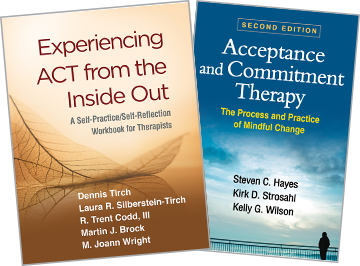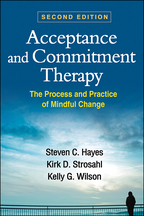Acceptance and Commitment Therapy
Second Edition
The Process and Practice of Mindful Change
Steven C. Hayes, Kirk D. Strosahl, and Kelly G. Wilson
HardcoverPaperbacke-bookprint + e-book
Hardcover
orderSeptember 28, 2011
ISBN 9781609189624
Price: $78.00 402 Pages
Size: 6" x 9"
Paperback
orderAugust 29, 2016
ISBN 9781462528943
Price: $52.00402 Pages
Size: 6" x 9"
Check out a special package offer including this title!

Sign up for emails on upcoming titles on Mindfulness (with special discounts)!
“A 'must read' for everyone in the field of psychotherapy or behavior therapy, as well as students entering the profession. The significantly revised second edition reviews the growing body of research support for ACT and presents new developments in case conceptualization and treatment implementation.”

—David H. Barlow, PhD, ABPP, Professor Emeritus of Psychology and Psychiatry and Founder, Center for Anxiety and Related Disorders, Boston University
“Acceptance and Commitment Therapy, Second Edition, presents new data and clinical insights and expresses the theoretical foundations of ACT in a fresh way. The original book was an extraordinary achievement; the second edition is even better. It shows exactly how basic science and therapeutic application can combine in the service of new and effective methods to alleviate suffering. This book is essential reading for all students and practitioners in clinical psychology, counseling, and psychiatry.”

—Mark Williams, DPhil, Emeritus Professor of Clinical Psychology, University of Oxford, United Kingdom
“Presents an influential approach to helping clients accept their thoughts and feelings and overcome experiential avoidance....The authors delineate a solid clinical rationale and provide clear guidelines for ACT implementation. A real strength of this book is the chapters on each stage of treatment, which detail a wealth of strategies and interventions and include excellent exercises, therapist-client dialogues, and pointers for practice.”

—Leslie S. Greenberg, PhD, Distinguished Research Professor Emeritus of Psychology, York University, Canada
“In the dynamic field of mindfulness-based therapies, this impressive book is a landmark contribution. The authors offer a sophisticated and wise approach to human transformation, one that has been validated by clinical research and honed by a wide range of clinical applications. This second edition is ideally suited for graduate-level courses in psychotherapy as well as for mental health practitioners. It offers a balance of rich theoretical context and clear, accessible guidance for applying ACT to a range of emotional and behavioral difficulties.”

—Tara Brach, PhD, author of Radical Acceptance
“This second edition is perfectly timed, given the explosion of developments in the underlying theoretical principles and empirical research associated with this approach to treatment. The book is beautifully written and is an outstanding resource for clinicians and researchers alike, whether novice or experienced. The principles of functional contextualism and relational frame theory are laid out in an easily understandable yet in-depth manner. The book's presentation of the core principles of ACT—including practical guidance for implementing them in clinical practice—is simply superb. This is an excellent text for graduate students in clinical psychology.”

—Michelle G. Craske, PhD, Professor and Vice Chair of Psychology and Director, Anxiety Disorders Research Center, University of California, Los Angeles
—David H. Barlow, PhD, ABPP, Professor Emeritus of Psychology and Psychiatry and Founder, Center for Anxiety and Related Disorders, Boston University
“Acceptance and Commitment Therapy, Second Edition, presents new data and clinical insights and expresses the theoretical foundations of ACT in a fresh way. The original book was an extraordinary achievement; the second edition is even better. It shows exactly how basic science and therapeutic application can combine in the service of new and effective methods to alleviate suffering. This book is essential reading for all students and practitioners in clinical psychology, counseling, and psychiatry.”
—Mark Williams, DPhil, Emeritus Professor of Clinical Psychology, University of Oxford, United Kingdom
“Presents an influential approach to helping clients accept their thoughts and feelings and overcome experiential avoidance....The authors delineate a solid clinical rationale and provide clear guidelines for ACT implementation. A real strength of this book is the chapters on each stage of treatment, which detail a wealth of strategies and interventions and include excellent exercises, therapist-client dialogues, and pointers for practice.”
—Leslie S. Greenberg, PhD, Distinguished Research Professor Emeritus of Psychology, York University, Canada
“In the dynamic field of mindfulness-based therapies, this impressive book is a landmark contribution. The authors offer a sophisticated and wise approach to human transformation, one that has been validated by clinical research and honed by a wide range of clinical applications. This second edition is ideally suited for graduate-level courses in psychotherapy as well as for mental health practitioners. It offers a balance of rich theoretical context and clear, accessible guidance for applying ACT to a range of emotional and behavioral difficulties.”
—Tara Brach, PhD, author of Radical Acceptance
“This second edition is perfectly timed, given the explosion of developments in the underlying theoretical principles and empirical research associated with this approach to treatment. The book is beautifully written and is an outstanding resource for clinicians and researchers alike, whether novice or experienced. The principles of functional contextualism and relational frame theory are laid out in an easily understandable yet in-depth manner. The book's presentation of the core principles of ACT—including practical guidance for implementing them in clinical practice—is simply superb. This is an excellent text for graduate students in clinical psychology.”
—Michelle G. Craske, PhD, Professor and Vice Chair of Psychology and Director, Anxiety Disorders Research Center, University of California, Los Angeles



